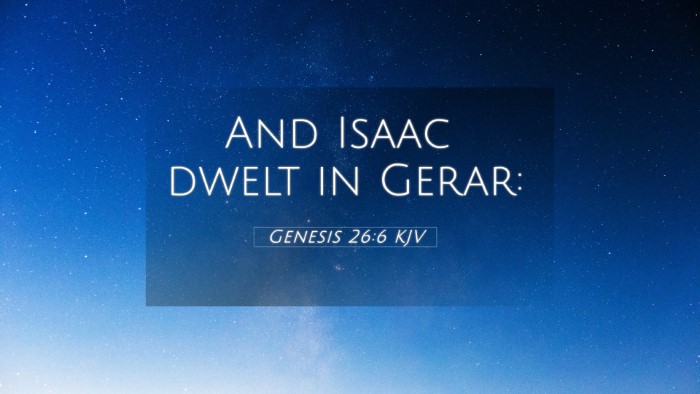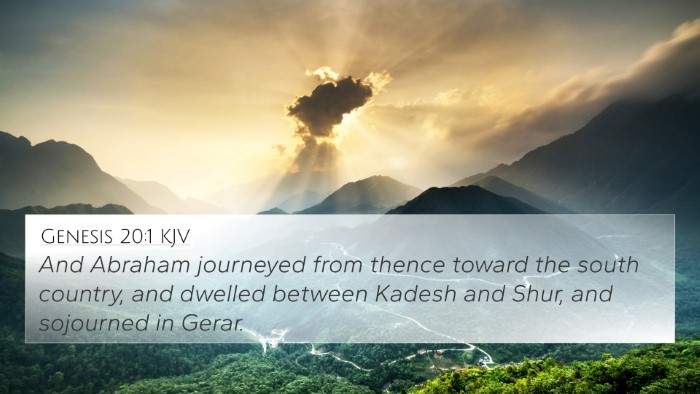Understanding Genesis 26:6
Genesis 26:6 states: "So Isaac stayed in Gerar." This verse, while brief, conveys profound significance in the narrative of Isaac's life and his obedience to God's guidance. Various public domain commentaries provide insights into the implications of this verse.
Historical Context
Isaac, the son of Abraham, is depicted here during a time of famine. Rather than seeking to escape to Egypt, as his father did, Isaac remains in the land where God had told him to reside. This action reflects trust and obedience to God's commands.
Insights from Commentaries
-
Matthew Henry:
Henry emphasizes Isaac's obedience as a demonstration of faith. He notes that staying in Gerar, despite difficulties, showcases Isaac's dependence on God to fulfill His promises. This act serves as a template for believers facing trials.
-
Albert Barnes:
Barnes highlights the significance of Isaac's location. By remaining in Gerar, Isaac is aligned with God's purpose and plans, reinforcing the idea that believers should seek to remain in the will of God, regardless of their circumstances.
-
Adam Clarke:
Clarke points out the importance of Isaac's character as a man of faith. He notes that this passage illustrates Isaac's reliance on divine direction rather than human reasoning or cultural norms of the time.
Thematic Connections
This verse establishes thematic connections throughout the Bible, linking it to several other themes and narratives:
-
Faith and Obedience:
Isaac's choice mirrors Abraham's obedience when called to sacrifice his son. Both demonstrate unwavering faith in God's promises, emphasizing the importance of adhering to God's directions.
-
God's Provision:
Remaining in Gerar amidst famine corresponds to God's provision for His people, a recurring theme in scriptures such as Matthew 6:31-33, reminding believers of His ultimate care.
-
Divine Promise:
The reference to staying in a land despite difficulties also evokes the promise made to Abraham in Genesis 12:1-3, ensuring that Isaac is part of God's covenant with his forefather.
Cross-References
Here are some related Bible cross-references that illuminate Genesis 26:6:
- Genesis 12:10 - Abraham's decision to go to Egypt during famine.
- Genesis 13:1-2 - Abraham's wealth and the importance of staying where God leads.
- Genesis 22:1-2 - The call to obedience in a challenging circumstance.
- Genesis 15:13 - God's prophecy about Israel's future in a land not their own.
- Psalm 37:3 - “Trust in the Lord and do good.”
- Isaiah 41:10 - Assurance of God's presence in trials.
- James 1:2-3 - Joy in trials, paralleling Isaac's trust.
- Romans 4:20-21 - Abraham did not waver through unbelief, linking both patriarchs’ faith.
- Acts 7:4 - Reference to God calling Abraham out from one land into another.
- Hebrews 11:9-10 - Faith of Abraham and Isaac in living as strangers on the earth.
Conclusion
Genesis 26:6 serves as a powerful reminder of the importance of fidelity to God's directions. Through this verse and its interconnected themes, believers are encouraged to trust in God's plan, even during times of uncertainty. By employing tools for cross-referencing, one can deepen their understanding of the biblical narrative and how various scriptures inform and enhance one another.
As you explore the connections between Bible verses, consider how each narrative builds upon the former, revealing a cohesive story of faith, obedience, and divine promise.



